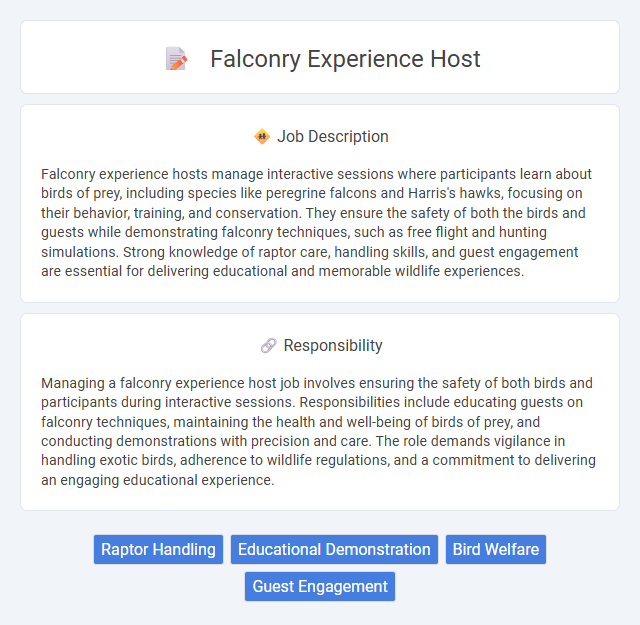
Falconry experience hosts manage interactive sessions where participants learn about birds of prey, including species like peregrine falcons and Harris's hawks, focusing on their behavior, training, and conservation. They ensure the safety of both the birds and guests while demonstrating falconry techniques, such as free flight and hunting simulations. Strong knowledge of raptor care, handling skills, and guest engagement are essential for delivering educational and memorable wildlife experiences.
Individuals with a passion for wildlife and outdoor activities are likely suitable for a falconry experience host job, as it demands physical stamina and patience to handle birds of prey safely. People with strong communication skills and the ability to engage and educate visitors may find this role enjoyable and fulfilling. However, those uncomfortable with animals or unable to perform moderate physical tasks might find this job challenging and less suitable.
Qualification
Falconry experience hosts must possess comprehensive knowledge of raptor behavior, handling techniques, and safety protocols to ensure a secure and educational environment. Certification or formal training in wildlife management, falconry licensing, and first aid qualifications significantly enhance credibility and operational compliance. Strong communication skills and the ability to engage diverse audiences are essential for delivering immersive falconry demonstrations and fostering guest understanding.
Responsibility
Managing a falconry experience host job involves ensuring the safety of both birds and participants during interactive sessions. Responsibilities include educating guests on falconry techniques, maintaining the health and well-being of birds of prey, and conducting demonstrations with precision and care. The role demands vigilance in handling exotic birds, adherence to wildlife regulations, and a commitment to delivering an engaging educational experience.
Benefit
Hosting a falconry experience likely offers a unique opportunity to engage with clients passionate about wildlife and nature, enhancing communication and educational skills. There is a strong probability that the role provides hands-on interaction with birds of prey, fostering a deeper understanding of raptor behavior and conservation efforts. The position may also yield personal fulfillment from sharing this ancient art, potentially improving teamwork and event management abilities.
Challenge
Taking on a falconry experience host job likely involves navigating unpredictable bird behavior and ensuring guest safety, which may present consistent challenges. The role might require adapting quickly to varying weather and environmental conditions that could affect demonstrations. Strong problem-solving skills and quick decision-making probably play key roles in successfully managing the dynamic nature of falconry experiences.
Career Advancement
Falconry experience host positions offer unique opportunities for career advancement within wildlife education and conservation fields. Professionals in this role develop specialized skills in raptor handling, public speaking, and environmental awareness, opening pathways to leadership roles in environmental centers, zoos, and nature reserves. Mastery in falconry also enhances prospects for careers in ecological research, wildlife rehabilitation, and outdoor education program management.
Key Terms
Raptor Handling
Expertise in raptor handling is essential for a falconry experience host, ensuring safe and engaging interactions with birds of prey such as falcons, hawks, and eagles. The host is responsible for training, caring for, and demonstrating flight techniques while educating guests on the behavior and conservation of raptors. Comprehensive knowledge of bird anatomy, safety protocols, and wildlife stewardship enhances the overall falconry experience and guest satisfaction.
Educational Demonstration
Falconry experience hosts provide engaging educational demonstrations that showcase the skills and behaviors of trained birds of prey, offering guests an immersive understanding of raptors' roles in ecosystems. These hosts explain falconry techniques, bird anatomy, and conservation efforts, fostering appreciation for wildlife and environmental stewardship. Their expertise ensures both safety and educational value, enhancing visitor interaction through live flying displays and informative commentary.
Bird Welfare
A falconry experience host ensures the highest standards of bird welfare by monitoring the health and behavior of raptors daily, providing proper nutrition, and maintaining clean aviaries. Expert knowledge in species-specific needs and stress reduction techniques is essential to promote natural behaviors and prevent injury during demonstrations. Preventive care and ethical handling practices guarantee the birds' well-being while enriching guest education and engagement.
Guest Engagement
Falconry experience hosts play a crucial role in guest engagement by providing personalized, hands-on demonstrations that connect visitors with the ancient art of falconry. They expertly guide guests through the behavior, training, and history of birds of prey, ensuring an immersive and educational experience. Effective hosts create memorable interactions by fostering a safe environment where guests can handle falcons and learn about conservation efforts.
 kuljobs.com
kuljobs.com